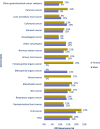Clostridioides difficile recurrence in individuals with and without cancer: a Swedish population-based cohort study
- PMID: 38407777
- PMCID: PMC10954957
- DOI: 10.1007/s15010-024-02193-1
Clostridioides difficile recurrence in individuals with and without cancer: a Swedish population-based cohort study
Abstract
Purpose: Patients with cancer are vulnerable to Clostridioides difficile infection (CDI) due to their disease, treatment and regular hospital contact, yet if CDI-recurrence is more common remains unclear, and differences among cancer types remain unexplored.
Methods: This Swedish nationwide population-based cohort included all 43,150 individuals with recorded CDI (2006-2019) to assess CDI-recurrence in individuals with and without cancer, with binary multivariable logistic regression, stratified by anatomical location, and survival status.
Results: Compared to those without cancer (N = 29,543), ongoing cancer (diagnosis < 12 months; N = 3,882) was associated with reduced recurrence (OR = 0.81, 95% CI 0.73-0.89), while there was no association with cancer history (diagnosis ≥ 12 months; N = 9,725). There was an increased 8-week all-cause mortality (Ongoing cancer: OR = 1.58, 95% CI 1.43-1.74; Cancer history: OR = 1.45, 95% CI 1.36-1.55) compared to those without cancer. Among CDI-survivors, those with ongoing cancer presented with a decreased odds of recurrence (OR = 0.84, 95% CI 0.76-0.94), compared to those without cancer history, with no association for those with cancer history (OR = 1.04, 95% CI 0.97-1.1). Large variations were seen across cancer types, with the highest observed proportion of recurrence in oral and mesothelial cancer, and the lowest for esophageal cancer, although no statistically significant OR were found.
Conclusion: The population-based study indicates that individuals with cancer may have fewerrecurrences than expected, yet variations by cancer type were large, and mortality was high.
Keywords: Clostridioides difficile; Cancer; Epidemiology; Real World Evidence; Recurrence; Risk factors.
© 2024. The Author(s).
Conflict of interest statement
There are no conflicts of interest declared by the authors.
Figures



Similar articles
-
Clostridioides difficile infection, recurrence and the associated healthcare consumption in Sweden between 2006 and 2019: a population-based cohort study.BMC Infect Dis. 2024 May 3;24(1):468. doi: 10.1186/s12879-024-09364-3. BMC Infect Dis. 2024. PMID: 38702635 Free PMC article.
-
Clostridioides difficile infection-associated cause-specific and all-cause mortality: a population-based cohort study.Clin Microbiol Infect. 2023 Nov;29(11):1424-1430. doi: 10.1016/j.cmi.2023.07.008. Epub 2023 Jul 19. Clin Microbiol Infect. 2023. PMID: 37473840
-
Clostridioides difficile infection recurrence in the VINCat hospitals: a prospective observational cohort study.Future Microbiol. 2022 Dec;17:1445-1453. doi: 10.2217/fmb-2022-0076. Epub 2022 Oct 31. Future Microbiol. 2022. PMID: 36314417
-
Challenges in the Diagnosis and Management of Recurrent and Severe Clostridioides difficile Infection in Children.J Pediatric Infect Dis Soc. 2021 Nov 17;10(Supplement_3):S27-S33. doi: 10.1093/jpids/piab079. J Pediatric Infect Dis Soc. 2021. PMID: 34791399 Review.
-
Community-Associated Clostridioides difficile Infection in Children: A Review of Recent Literature.J Pediatric Infect Dis Soc. 2021 Nov 17;10(Supplement_3):S22-S26. doi: 10.1093/jpids/piab064. J Pediatric Infect Dis Soc. 2021. PMID: 34791398 Review.
Cited by
-
Colon cancer and Clostridioides difficile infection: a not-so-lethal combination?Proc (Bayl Univ Med Cent). 2024 May 28;37(4):551-552. doi: 10.1080/08998280.2024.2355434. eCollection 2024. Proc (Bayl Univ Med Cent). 2024. PMID: 38910830 Free PMC article. No abstract available.
-
Risk factors and outcomes of Clostridioides difficile infection in patients with colorectal cancer: critical perspective in management.Gut Pathog. 2025 Jun 14;17(1):44. doi: 10.1186/s13099-025-00717-0. Gut Pathog. 2025. PMID: 40517235 Free PMC article. Review.
-
Clostridioides difficile infection, recurrence and the associated healthcare consumption in Sweden between 2006 and 2019: a population-based cohort study.BMC Infect Dis. 2024 May 3;24(1):468. doi: 10.1186/s12879-024-09364-3. BMC Infect Dis. 2024. PMID: 38702635 Free PMC article.
-
Risk Factors for Recurrence and In-Hospital Mortality in Patients with Clostridioides difficile: A Nationwide Study.J Clin Med. 2025 Jul 10;14(14):4907. doi: 10.3390/jcm14144907. J Clin Med. 2025. PMID: 40725598 Free PMC article.
References
-
- Cold F, Svensson CK, Petersen AM, Hansen LH, Helms M. Long-term safety following faecal microbiota transplantation as a treatment for recurrent Clostridioides difficile infection compared with patients treated with a fixed bacterial mixture: results from a retrospective cohort study. Cells. 2022 doi: 10.3390/cells11030435. - DOI - PMC - PubMed
MeSH terms
Grants and funding
LinkOut - more resources
Full Text Sources
Medical

